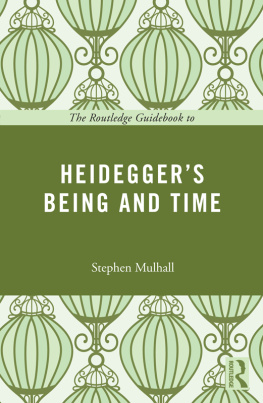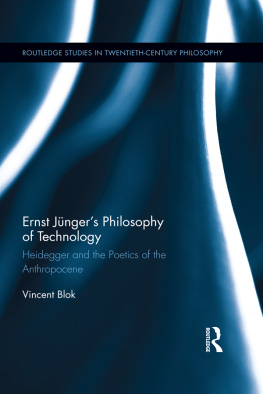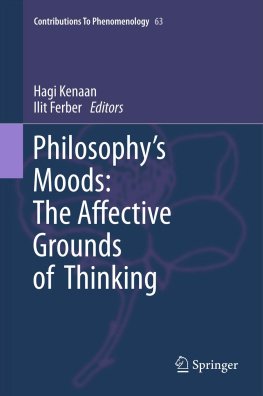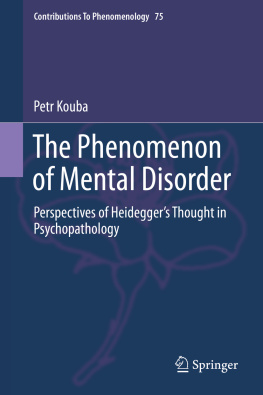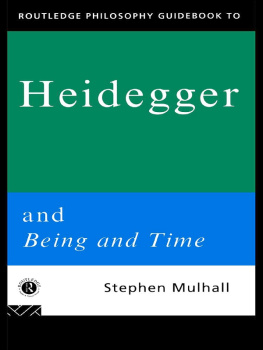Gregory P. Schulz
Copyright 2011 Gregory P. Schulz. All rights reserved. Except for brief quotations in critical publications or reviews, no part of this book may be reproduced in any manner without prior written permission from the publisher. Write: Permissions, Wipf and Stock Publishers, 199 W. 8th Ave., Suite 3, Eugene, OR 97401.
199 W. 8th Ave., Suite 3
www. wipfandstock.com
Manufactured in the U.S.A.
et inquietum est cor nostrum...
The trouble of the modern age is not merely the inability to believe certain things about God which our forefathers believed, but the inability to feel toward God and man as they did.
T. S. Eliot, On Poetry and Poets , italics added
Foreword
W hy do we care whether our feelings and moods are intentional? Why bother verifying what to most people seems an arcane question. Not everyone does care, of course. Philosophers ask such questions, and some psychologists and even some scientists, as least the neuroscientists who dialog with philosophers and psychologists. If not everyone cares, perhaps our question should be: Why should we care? One answer could be that if feelings and moods point to nothing, are about nothing, and go nowhere, then they are vain, epiphenomenal, superficial, and ultimately worthless passing mental events that we are just as well devaluing as minor aches and pains, as unimportant itches and twitches, as insignificant as fleeting thoughts and wishes, the temporarily distracting brain states that come and go but have no permanent meaning or value. But if our feelings and moods share status with our profoundest ideas and deepest desires and values, then they deserve our attention just as do the best of our ideas, those that direct human history, and as do those life-transforming commitments and decisions that we cherish as emerging from human freedom and self-determination. Are feeling and moods in that league?
Dr. Greg Schulz says they are, and he joins a solid but fairly youngas philosophical theories goorientation that feelings, emotions, the high-level affective states, including those of longer duration like moods and quasi-permanent dispositions, are not just happenings inside our skulls, but are parts of a much larger field with physical and biological roots, that emerge in the full history of the evolution of the human species and in the individual evolutions of each human person from conception onward throughout life. And what Greg cares about most is the social and ethical fields that emerge when humans have constructed lives sharing not only cognition and volition but also affection. What we have in this dense book is a carefully sequenced presentationone that will repay slow and patient study tolerant of expressions some of which are a bit difficult of access at firstof a coherent synthesis of distinct contributions to the thesis that affections reveal human existence as a general kind of being and as each ones individual life, just as helpfully and fundamentally as do our ideas and choices.
Why should we care? Because we need all the help we can get in the pursuit of meaning and value. Are we limited by our minds, by the history of human thought contained in all the lives and books? Or do we also have hearts? What about our feelings and passions, those affections that too much rational disdain shoves aside from the mainstream of solutions to the big questions? If our minds tell us that human existence is but sound and fury signifying nothing, could our hearts suggest otherwise? And of what import are our hearts if they do? What proof have we that what our hearts say about life and death, or love and hate, should merit our attention?
That is the question philosophers name the question about whether affections are intentional, about whether they point beyond their mere occurrence inside consciousness to objective (not merely subjective) outside reality, to the real world of meanings, and to the real world of values. The best and strongest contemporary work on this question is being done in field theory, which is the study of meta-individual, interpersonal groupings or arrangements now recognized to be primary rather than secondary in the constitution of the individuals and persons that exist within their force and dynamic flow. Since philosophy began, ideas were unquestioned powers that moved people to voluntary acts that themselves drove history, while feelings and moods were deemed ephemeral affective sensations that were disparaged as interfering with the minds and wills of the great thinkers and movers, especially in matters ethical and political; medieval theories considered them lower animal passions, sensual remainders from a brutish past we were better to leave behind. Only for about a century have major philosophers taken affectivity seriously enough to lead to its integration into a triadic conception of consciousness, to an understanding of the mind in the broad sense of consciousness, as threefold, as triune, in the term preferred by Paul MacLean in his pioneering The Triune Brain in Evolution. Triune consciousness maps onto the triune brain. But whereas the intentionality of two of the three kinds of consciousness was generally uncontested and therefore taken to locate us in the real world, the poor stepchild, our affective consciousness, was ignored or even maligned as not connected to outside reality at all, but said to report on an inside world of illusory emotions and moods. Does Wednesdays child describe life in everyones world or only life in the world of this child of Angst ?
Greg Schulz has here tried to answer this question using all the resources that have most recently become available while keeping his research accessible in a readable compass. He is well aware that he has really only opened a door rather than said the last word. No one ever has the last word, on this or on any perennial question that counts, on those questions that must drawn upon the best that the human, social, and physical sciences can contribute. What gives us hope that his opening will fare better than some others is that it moves out of the mind and into the social field, which is the only possible locus where intentionality can be tested given that the very meaning and value of any intentional consciousness, whether cognition, affection, or volition, is to work in the real world we share with others. What would we give for a kind of consciousness that revealed the world as it is, transcendent of wishful thinking and mere velleities? Is it Wednesdays child who holds the key, the key that opens that door?
Dr. Andrew Tallon
Professor of Philosophy
Marquette University
Preface
P hilosophy of emotion is a vital topic within contemporary philosophy of mind. Just think of the work being done by Ronald de Sousa, Antonio Damasio, Paul Griffiths, and John Searle, to mention a few names. Beginning from insights latent in Heideggers early philosophy, my argument is that, with the recognition of a suitable field of consciousness, it ought to be possible to speak scientifically about our noncognitional and nonvolitional but nevertheless rational moods, such as what Andrew Tallon in Head and Heart calls that most celebrated mood, namely, Angst.
With the emergence of twentieth-century existentialism and its attention to human experience, and with Heideggers revolutionary insight that an emotional mood such as Angst (long-term anxiety or anguish) has intentionality , the time was ripe for serious phenomenological work on the emotional aspect of our human being. Much more recently, advances in neurological imaging have enabled us to contemplate the phenomenon of human emotion scientifically. At present, the new discipline of social neuroscience affords us a philosophical and scientific opportunity to attend to the emotional aspect of our being, a long-neglected aspect of our humanity. Proceeding from Heideggers insight regarding the intentionality of moods, this dissertation adumbrates a type of social neuroscience capable of validating Heideggers understanding of the centrality of Angst for human being.



